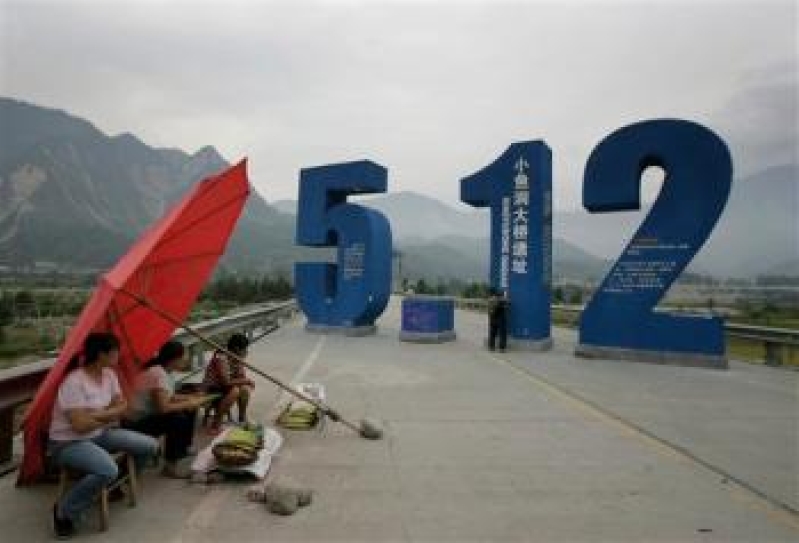
Since the 7.8 Richter-scale Sichuan earthquake took place on May 12th, the victim’s traumas are beginning to surface after weeks of denial. Addressing this issue, The Wall Street Journal recently published an article titled China Working Diligently to Address Post-quake Traumas, pointing out that almost everyone believes that the earthquake has left a deep mental trauma for the victims.
Meanwhile, a major problem is that the numbers of professionals who can provide mental wellness counseling are few. Furthermore, the report stated that after facing the series of natural disasters and its aftermath, China is apparently lacking professionals who have received proper training to deal with the basic mental health problems.
Rampant mental traumas, scarcity in counseling professionals, patients ignore the need for seeking for help, overseas professionals welcome
Lisa LaDue, founder of the United States National Mass Fatalities Institute, worked in Sichuan after the earthquake, and expressed that among the survivors more than 20% of the people are experiencing short-term mental traumas. Furthermore, the grief that many victims suffered is unforgettable. Since the initial quake, there has been series of aftershocks, which reminded one that one cannot trust on the ground one stands on.
Furthermore, the symptoms of post-trauma anxiety disorders and problems can be spotted only after several weeks after the initial trauma. Characteristics of these symptoms include amnesia and tendencies to commit suicide. The experts who are currently working in Sichuan reported that the marks of hopelessness, depressions, and suicide are continuing to increase.
On one hand, the level of the mental traumas is characterized as solemn; on the other hand, the number of professional counselors and their experience are far below the actual need. Regarding the problem of dealing with mental traumas, Wei-li Wu, psychologist and director of the China West Normal University Counseling Center, trained at least 600 local medical staffs in Sichuan. Yet, the truth is that Wu is not a specialist in treating post-trauma anxiety disorders. In her 19 years career, she provided counseling mostly for college students faced with discouragements from education and relationships. She expressed that their professionals are really limited.
Yet another hindering factor is the suppression of emotions found commonly in the Chinese culture, where outwardly those who were affected appeared as calm. According to a research report conducted by Beijing Horizon Research Consultancy Group released last month, only 25% of Chinese said they would seek for help when they have a problem, and around 26% of them said that they would rather keep it private in fear of others labeling them as ones with mental problems.
Currently, various relevant departments to the earthquake relief are concerned about the survivor’s mental wellness. Chinese state-media has been reporting about this point on a large-scale, such as the relevant departments promised to provide all students with mental health counseling after school begins in the fall. They also expressed the welcome the professional knowledge from overseas and permits foreigners to treat the survivors.
Overseas Christians diligently assisting the post-disaster mental health rebuilding, offering prayers and blessings, providing mental health counseling and comforts of the gospel
Ever since the Sichuan earthquake, overseas Christians – the Chinese churches - in particular, have been providing large amount of disaster-relief supplies, money and volunteer services, and have been concerned about the post-disaster mental trauma and reconstruction.
Christian organizations such as World Vision, Salvation Army, and Hong Kong YMCA have been concerned with the need of the disaster victims for mental counseling, and have been actively providing assistance. Rev. James Hudson Taylor III, founder of Medical Service International, has been invited by universities, hospitals, and medical schools in Sichuan to go to mainland to conduct the work of mental treatment.
Chinese churches in North America, Hong Kong, and other places have been praying for the victims suffering from mental distress. Hong Kong Chinese Christian Churches Union, Media Evangelism, and various Christian ministries held a gathering for all Christians in Hong Kong to share and pray: “Emergency Gathering: Sichuan Disaster Relief – All Hong Kong Christians Prayer and Action”, which inspired the participants to walk in the shoes of the victims of Sichuan earthquake and pray for the disaster relief efforts, reconstruction efforts, and for those suffering from mental traumas. They urged for prayers and actions to help the victims to walk out from the pains and grief, to join the medical rescue team, and to participate in the work of providing emotional support for the Sichuan victims.
Besides this, the churches know that although the need for medical rescue teams and mental wellness counseling is absolutely necessary, but the more urgent need to comfort the souls of the people. As a result, they view the reconstruction of local churches and the sharing of the message of the gospel with the victims so they can have true peace as equally important.
Rev. James Hudson Taylor III, honorary chairman and co-founder of Medical Service International, shared a passage from the Bible where Jesus said that I came not to be served but to serve.
Taylor exhorted the brothers and sisters on praying for the victims and called the believers to rebuild the mother country at this urgent time.
“Let us and the victims together rebuild their bodies, rebuild their wounded spirit, rebuild houses, and rebuild churches. The first thing that we can do is to understand the importance of prayer, let the power of our prayers touch the hands of almighty God. The second is to fulfill the Lord’s Great Commission by going to mainland and serving the victims with our expertise and experiences”, urged the grandson of Hudson Taylor.
[Editor's note: reporter Ruth from San Francisco provided this report.]







